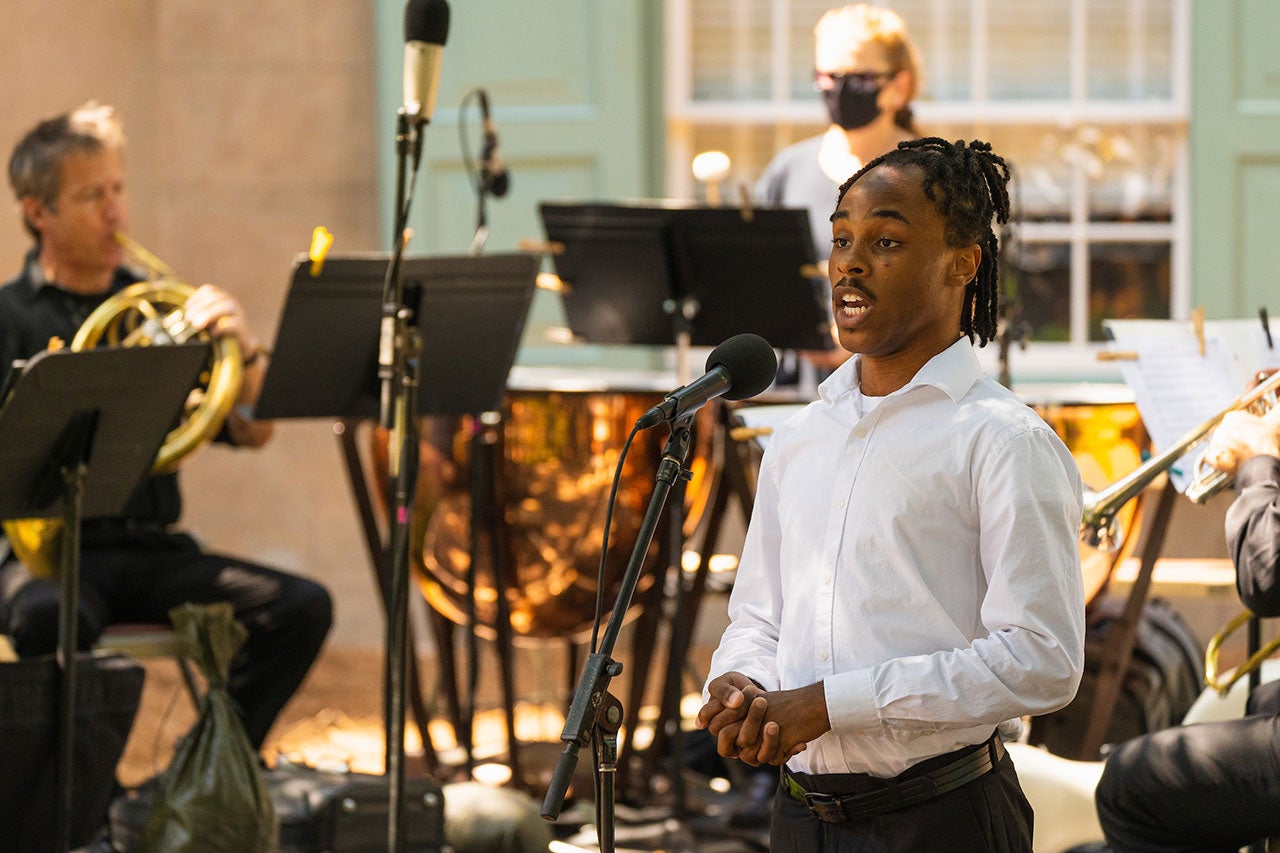Above: Charleston Mens Chorus scholarship recipient Driq Graves sings the national anthem during spring 2021 commencement. (Photo by Mike Ledford)
Music is a shared experience – one that brings life to our greatest joys and comfort to our deepest sorrows. It gives us a space to be our truest selves and connect with others who also have a song in their heart.
That ethos is exactly why the Charleston Mens Chorus exists. Founded in 1990 as a volunteer group, the chorus offers a community for male singers to sing with. Out of the group’s love for music has grown a desire to help younger singers follow that same passion.
That’s why the organization funds annual scholarships for two male College of Charleston choral students who are focusing their studies in vocal performance or choral conducting.
“It is a huge part of our mission to foster music education for male singers,” says Charleston Mens Chorus President Joe Brockington. “We also want to develop more singers for the next generation to continue the tradition of the men’s chorus.”
Which is why, in addition to getting financial support, recipients of the Charleston Mens Chorus scholarships are invited to be members of the ensemble. It’s an opportunity that offers the students mentorship from older members established in their careers and provides new vocal talent to the chorus.
“The students help fill out our sound and voice,” says Brockington. “Often our younger singers are our best singers. The fact that they’re voice majors at the college level puts them ahead of most of our members who sing as a hobby.”

Driq Graves (bottom left) performed with the Charleston Mens Chorus as part of a scholarship he received through the organization.
As a three-year recipient of the scholarship, Driq Graves ’21, a music major with a concentration in vocal performance, has made the most of the experience. Even as the coronavirus pandemic forced the Charleston Mens Chorus to rehearse in an outdoor parking garage, socially distanced and wearing masks, Graves continued to show up and step up to support the group.
“He’s extremely talented and balances that talent with modesty,” says Brockington, adding that Graves is always willing to help move equipment, sing solos and assist other choir members in learning the music.
“Of course, being a college student, anything that can help me financially is a big benefit, but the mentorship is also a big part of the scholarship,” says Graves. “The men who are in the Charleston Mens Chorus are always asking what they can do to help my well-being not only as a student, but as a person and as a member of their chorus.”
In fact, when the pandemic prevented Graves from earning money as a paid singer at church services around Charleston, forcing him to take on a part-time job to finish his senior year, the Charleston Mens Chorus awarded him additional financial support through the scholarship in recognition of his dedication and contributions to the organization.
“It was completely unexpected,” says Graves, who plans to continue studying voice with CofC faculty member David Templeton after graduation before then applying to graduate school to pursue a career in vocal performance.
School of the Arts Dean Edward Hart ’88, who has grown the school’s relationship with the Charleston Mens Chorus since taking the helm as the chair of the music department in 2013, says in a culturally rich community such as Charleston, building partnerships with organizations like the men’s chorus is integral to having a strong arts community within and beyond the walls of the College.
“It’s not only just a matter of financial philanthropy, it’s about having that relationship in terms of the music department being connected with them,” says Hart. “We all thrive in the entire School of the Arts through relationships with other arts and cultural groups in the community, and we’re only made stronger by that.”





